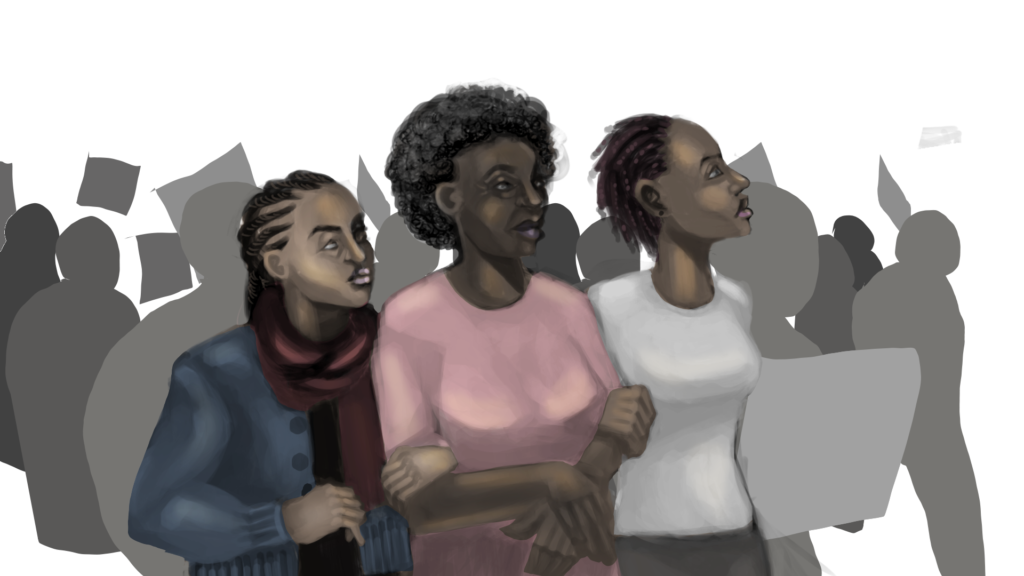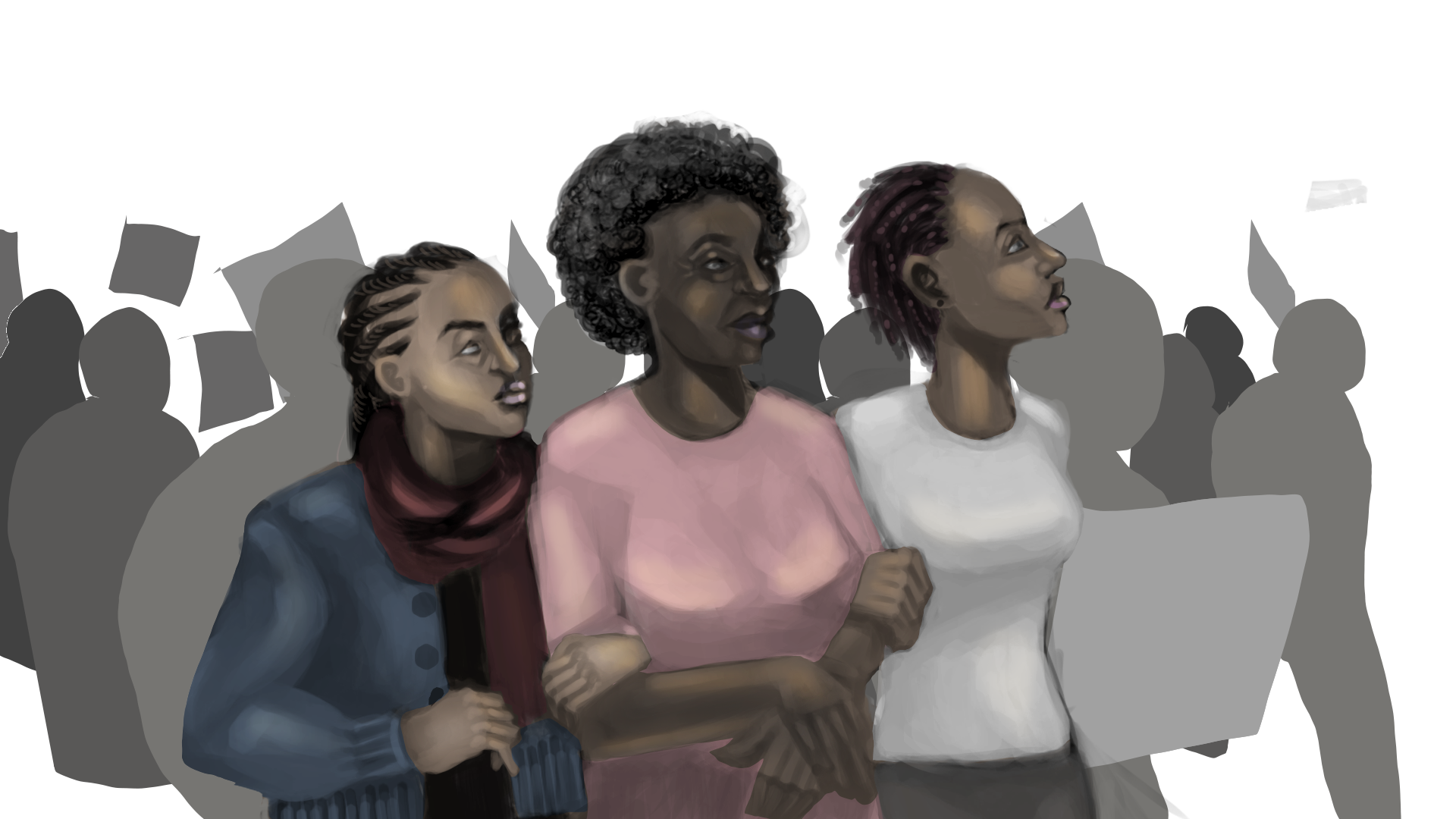A campaign about African women human rights defenders and courage in relation to 16 Days of Activism.
By DefendDefenders & AfricanDefenders
Illustrations: Primordial M
The Story of Martha (1:3)
Listen to the podcast here:
A woman could be heard screaming from a distance in the town square. The distinct sound of a whip hitting her body could be heard reverberating throughout the town. A small crowd of onlookers were gathering around quietly, curious to see what was going on, and to find out why this woman was being beaten.
Nuru was rushing home so she could prepare lunch, when she spotted the crowd of onlookers. Despite being aware that she would get in trouble with her father if she was late, she was drawn towards the woman.
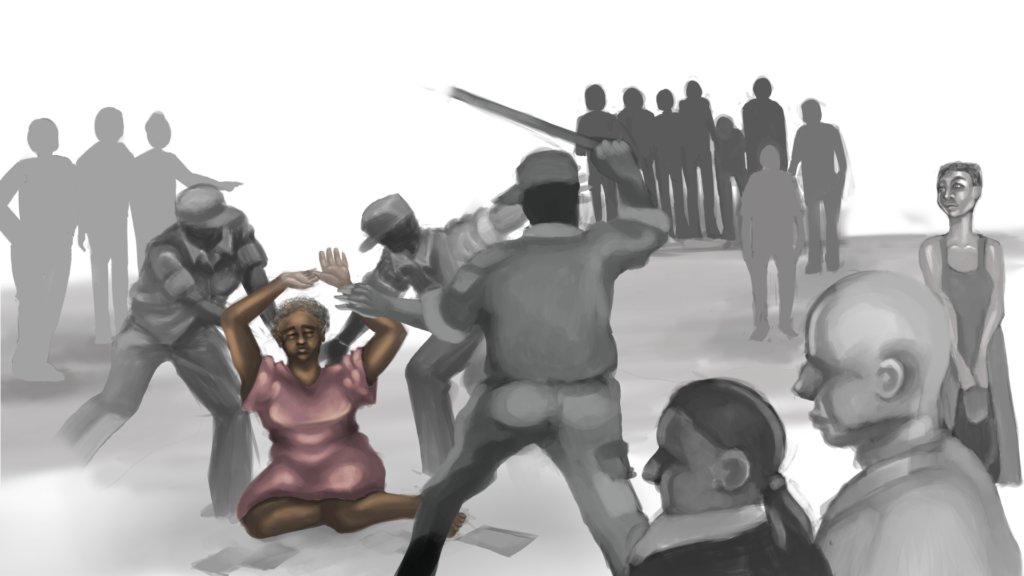
“What is going on?” she asked the man standing beside her.
“Oh, Martha started with her nonsense again. They should beat that devil out of her.”
The men in the town, especially the elders, did not appreciate when women challenged societal norms. In their mind, Martha was turning their wives and daughters against them with all this talk of women’s rights and liberation. They had complained to the mayor of the town, Mr. Tapiwa, when they caught wind of the women’s march that Martha was organising.
“This one is from Tapiwa,” one of the policemen said before hitting Martha.
“I heard she is secretly a man,” Nuru heard a woman whisper, “why else would she behave like this? This is not how women are supposed to behave.”
“I heard she is just trying to break our marriages, so we are miserable and alone like her,” another whispered.
“She is a witch. She does not even have children and she is trying to tell us how to bring up our daughters.”
“I heard she is a prostitute. She is just trying to corrupt us,” the whispers continued.
“I feel bad for her, but she should know that activism is not the work of a woman,” a man chimed in.
The police eventually stopped harassing and beating Martha, before taking off. The crowd slowly dispersed, without offering her any help. Eventually, Nuru was the only one left.
She looked around nervously as if trying to make sure no one was looking. As much as she felt sorry for her, she was scared to go against the people of the town. She did not want to be an outcast like Martha. When she was sure no one was looking, she reached out for Martha’s hand helping her to her feet.
“Why did they do this to you?” Nuru asked, while watching the older woman wince in pain as she started walking.
“I was fighting for your rights.”
“What do you mean my rights?”
Martha gestured at a nearby bench for them to sit on.
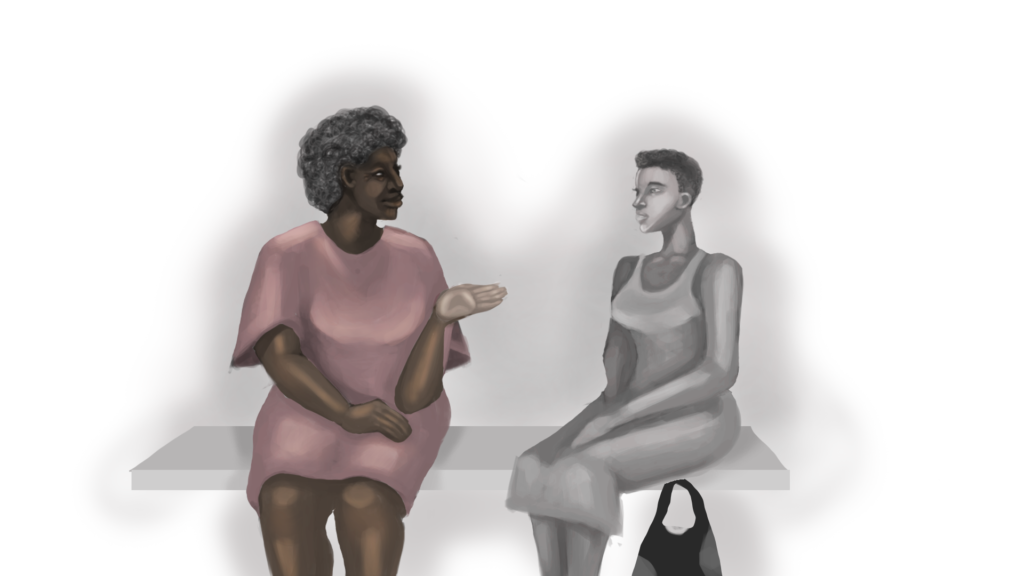
“Don’t you want to live in a world where you have choices?” Martha asked.
“I do have choices. I make choices every day,” Nuru said defensively.
Martha looked at Nuru, slightly raising an eyebrow. “Did you know you could own property, get an education, be equal to your father and brothers?” Martha continued.
Nuru stared into the distance with a look of longing. She had always wanted more for herself, but she had come to accept her life. Also, she was too scared to go against her father. “My father would never allow it, “she finally said.
Martha reached into her bag and retrieved a card. “This organisation can help you to learn more about your rights and can find you a good school. It is not his place to allow it. It is your right.”
Nuru hesitantly took the card and quickly pocketed it, afraid someone would see.
“I heard you are organising a march tomorrow.”
Martha nodded and handed her a flier with all the information about the march. “You don’t have to come to this if you don’t want to, but at least think about what I told you.”
Nuru nodded while gathering her things. She was still not quite sure if she would dare to go against her father, after all, who would take care of the house? “You are really nice,” Nuru said. She felt like Martha needed to hear some kind words. Then, Nuru took off.
Despite a restless night and the pain from the beating, Martha got up early the next morning to get ready for the march. The beating was the worst she had gotten since she started being outspoken about women’s rights.
She had received calls and text messages all morning from people backing out of her march. It had worked – the beating had served as a warning to anyone planning to participate. Martha felt ashamed to admit it to herself, but they were really close to breaking her. She had tried so hard to not let them win, but that beating might have been the straw that broke the camel’s back.
She held out hope that at least one other person would show up, but she had been standing there for an hour. At that point, it was apparent that the march was a complete failure. In that moment, it was hard to remember why she was fighting so hard for this.
As she sat down on the side of the road, with the sign Don’t tell me how to dress – tell them not to rape, next to her, a single teardrop ran down her face. With a sigh she reached out for the sign, resigning to go home. Instead of feeling the wooden base of the sign, she felt a hand touching hers. She looked up in panic, expecting to see the policemen from the previous day. Instead, it was Nuru.
“What are you doing here?” Martha asked in a confused tone, quickly drying her tears.
“We want to fight for our rights.”
“We?” asked Martha, even more confused. She then saw a group of women behind Nuru.
“We came to stand with you and all the women and girls in town,” Nuru said.
Martha smiled. She stood up grabbing the rest of the signs and handing them out to the group. They started chanting the slogans on the signs, marching towards Mr. Tapiwa’s office.
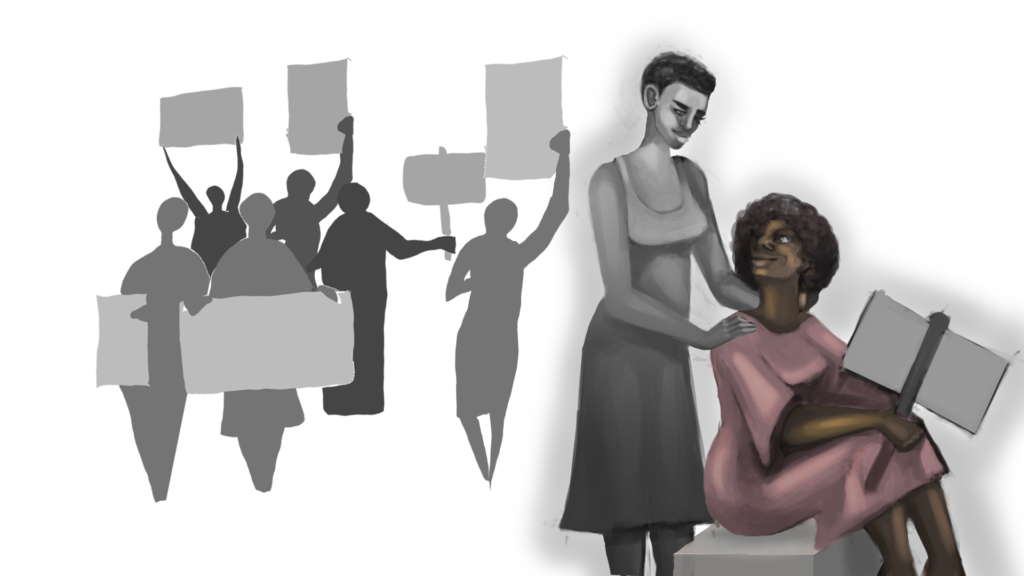
The story of Ayatunde (2:3)
Listen to the podcast here:
“Hey! Watch out!” a boy yelled as he manoeuvred his bike to avoid hitting the woman standing on the sidewalk.
She had just come out from the Mayor’s office, to seek his help in ending the increased level of attacks against the LGBT+ community. She started following what sounded like protest chants, and a group of women marching on the road appeared before her.
“Come on!” one of the women yelled at her, beckoning her to join them, “today is the day to be heard.” The woman’s words acted like a magnet, and Ayatunde found herself reaching out for one of the signs, joining the women.
“My name is Martha. What is your name?” the woman who had called out to her asked.“Ayatunde,” she answered.
“Nice to meet you,” she said, then marched to the front of the line chanting a slogan. Ayatunde smiled to herself, she admired the woman’s enthusiasm. For the first time in a long time, she felt optimistic – it felt like coming home. She quietly chuckled at this thought, given that she had just met these women. Maybe it was the solidarity that they seemed to have, despite their differences.
People around her had not been kind since the information about her sexuality had become known. Her parents had a hard time in particular. They blamed it on “western” influence, which the village had warned her against when she insisted on going to university to study human rights law. “I knew that university was a bad idea,” her mother had said sobbing uncontrollably when she had finally dared to tell them that she liked women. Her father had simply held his head down in shame and disappointment. He had not been able to look at her in the eyes ever since.
Things had gotten worse since she started being vocal in the community about the mistreatment of young people who were suspected to have the so-called “disease.” The village had blamed her, claiming that she was trying to spread it to other people. Her parents had kicked her out because they felt that she was bringing them shame. “Just give them time,” her grandmother had said when she showed up in the middle of the night at her house to find refuge.
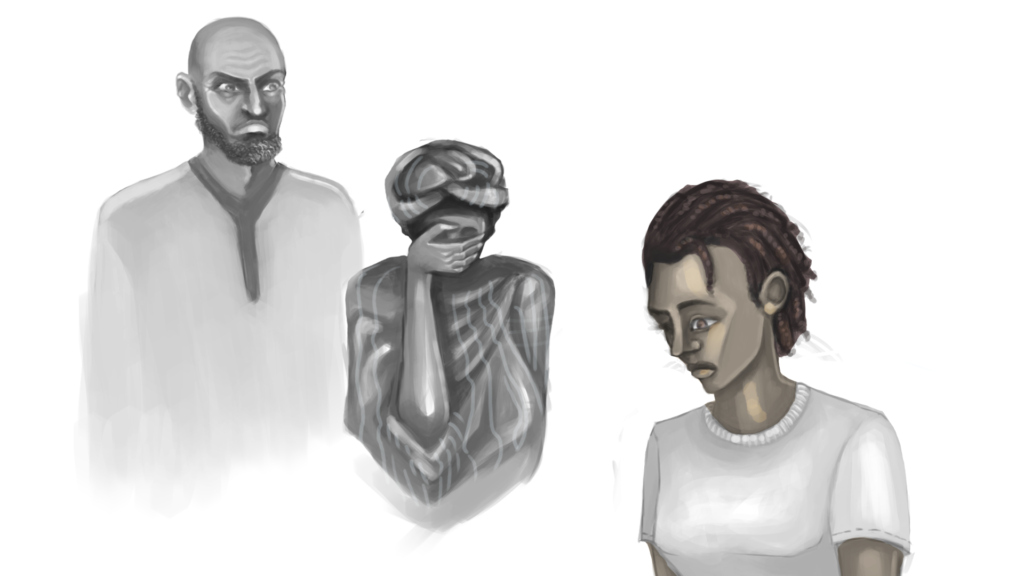
The situation escalated when the local high school expelled some students claiming they were promoting and engaging in “unnatural acts.” Ayatunde had taken the matter to court – sexual orientation had nothing to do with one’s education. The village elders were incensed by her actions, especially when she was not fazed by their veiled threats. They decided to meet her parents in secret to discuss ways to “cure” her. It was decided that she was going to be married off. They figured that by forcing her to marry she would overcome “the disease.” When her parents got wind of her planned escape from the village, they called the police on her. After a few nights in a dirty police cell, they eventually let her go, but she had understood that there was no place for her in the village.
Ayatunde thought that things were bound to improve in the town. After all, the LGBT+ community was larger there, and many of them were fighting for their rights. However, last week, while walking home from dinner with a friend, a group of men attacked her, threatening to show her a “good time” and “what she was missing.”. Her friends had warned her that the police would not help, but she reported the incident anyway. Her friends were right. The police told her that if they were to take a report, she would also have to be arrested, since the way she was living was against the law. A couple of days after that, the local newspaper had published a list of people suspected to have the affiliation with the LGBT+ community, with their photos, phone numbers, and addresses. Consequently, the attacks against the LGBT+ community increased. Although Ayatunde was not part of that list, she felt that she had to speak up and try to get the local paper to recall that edition. A lot of people, her friends, were in danger, and she needed to help them
Before taking the matter to court, she decided to try to seek support from the town’s mayor, Mr. Tapiwa. “He is not in,” Tapiwa’s assistant said when she walked in the office with the newspaper in her hand.
“I can hear his voice,” Ayatunde said with a twinge of annoyance in her voice.
The assistant looked up from her computer staring at her straight in her eyes. “Look, he knows who you are and what you are. He does not have time for you,” she said bluntly.
Ayatunde sighed deeply and walked out, passing a woman walking in. She was wearing a beautiful indigenous cloth around one of her shoulders.
The story of Kaya (3:3)
Listen to the podcast here:
“Kaya, the famous human rights defender, the village champion. To what do I owe this pleasure?” Mr. Tapiwa said with sarcasm in his voice.
Kaya shifted uncomfortably in her seat. There was something about this guy that did not sit well with her, but what choice did she have? She had travelled almost four hundred kilometres, and he was the only one who agreed to meet her. “I need your help,” she finally said.
“Oh!” he feigned surprise.
“I am being attacked back home. Some days ago, the police broke into my house and stole very important documents.”
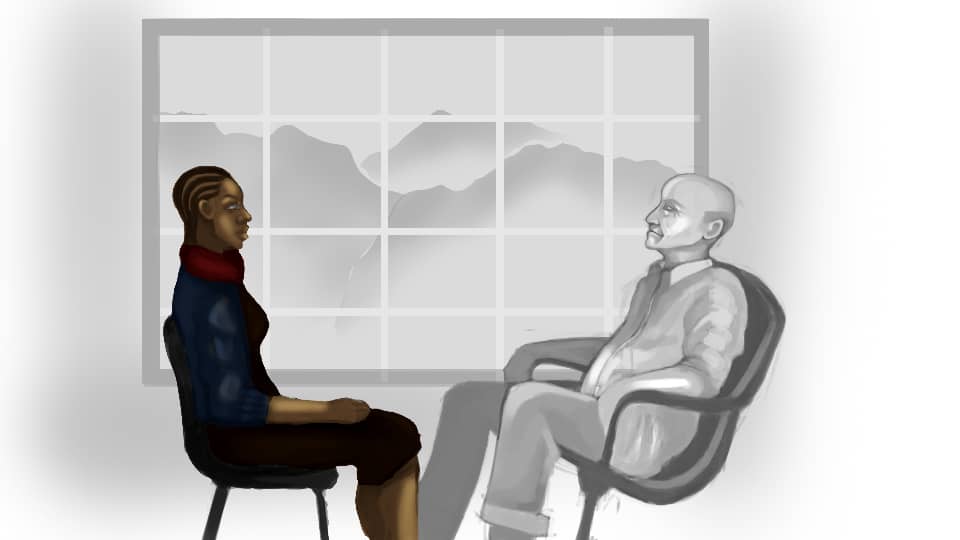
Tapiwa leaned back in his chair and started caressing a folder on his desk. “Stole? That is a very brave accusation. From what I understood you were suspected of brewing illicit alcohol.”
Kaya burst out laughing at the sheer ridiculousness of the accusation. “We both know that is not true,” she said.
Tapiwa shrugged, “if that is what they say happened, that is what I am inclined to believe.”
Kaya sighed, “they stole our land. Someone has to stand up to them. We had a life. I am determined to stand up and speak until we get our ancestral land back.”
Tapiwa leaned forward, “Kaya, I want nothing but for you to get your land back. These are also my tribesmen.”
“So then help us. These charges are not fair…. I …I did nothing wrong!” her face crumpled. She looked away to avoid him seeing her tearing up.
“Kaya, my hands are tied. You are messing with powerful people. Besides, this is development, you cannot live in the past. Change is coming and it is wise for you to embrace it.” Mr. Tapiwa did not seem to care that his version of development meant displacing people from their homes in order to make money. He reached across his desk and grabbed a box of tissues, handing them to her. “And anyway, the people you are fighting for do not want you to.”
Kaya rejected the box of tissues. It was true that she had clashed with the tribesmen. They were patriarchal, and many felt uncomfortable having a woman speak on their behalf. This frustrated Kaya because the elders had done nothing to stop the government and the big corporation from taking their ancestral land. For months they had helplessly watched their houses being destroyed and their trees cut to the ground. When she decided to stand up and speak about what was going on, she had ruffled a lot of feathers, including the men of the tribe. Kaya managed to bring a lot of visibility to the issue. That’s when the threats started, but she still continued. She managed to get the courts to hear her case, but that is when the local private security company had colluded with some men from her tribe to plant the illegal alcohol in her house, so that they could discredit her character and make it hard for the courts to take her seriously. They had also taken some important documents she was collecting for the case.
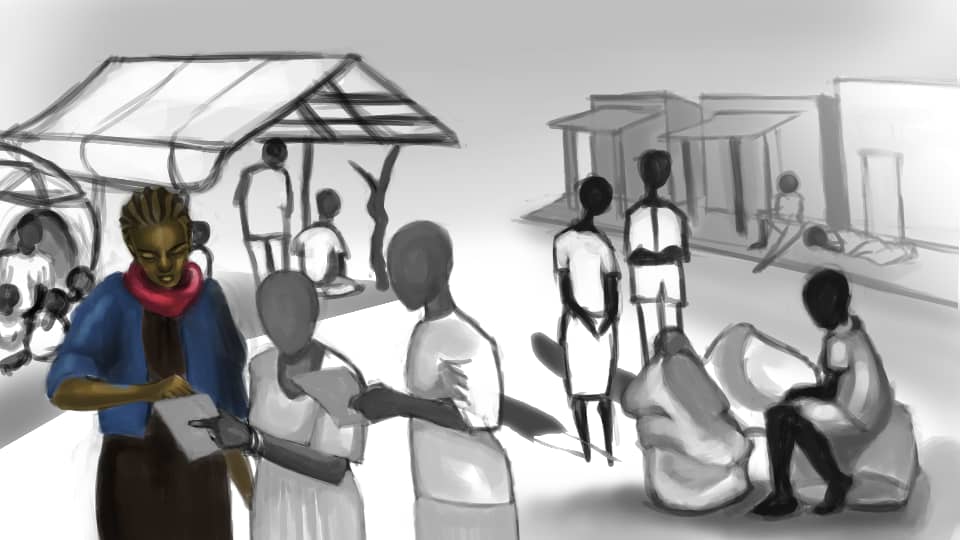
“So, you are just going to sit in this office while your people suffer?” Kaya said while gesturing around the room, “it is your job to listen to us and act.”
Tapiwa chuckled. “I like you Kaya. Your drive and tenacity are amazing.” He opened the casefile still sitting on his desk. “I cannot stop them from taking your land, but my word goes a long way… and I could even make this little nuisance about alcohol go away.”
“What do you want?” Kaya asked recognising the direction the conversation was heading.
Tapiwa chuckled clearly amused by the exchange. “I like you. You are a smart woman. Blunt, straight to the point.”
“I don’t have money if that is what you are after.”
Tapiwa shook his head. He moved his chair closer to her. “I wouldn’t be asking you, a beautiful woman, for money… but your problems could magically disappear if only you… ” Kaya abruptly removed the hand that was reaching out to her leg, almost vomiting in disgust.
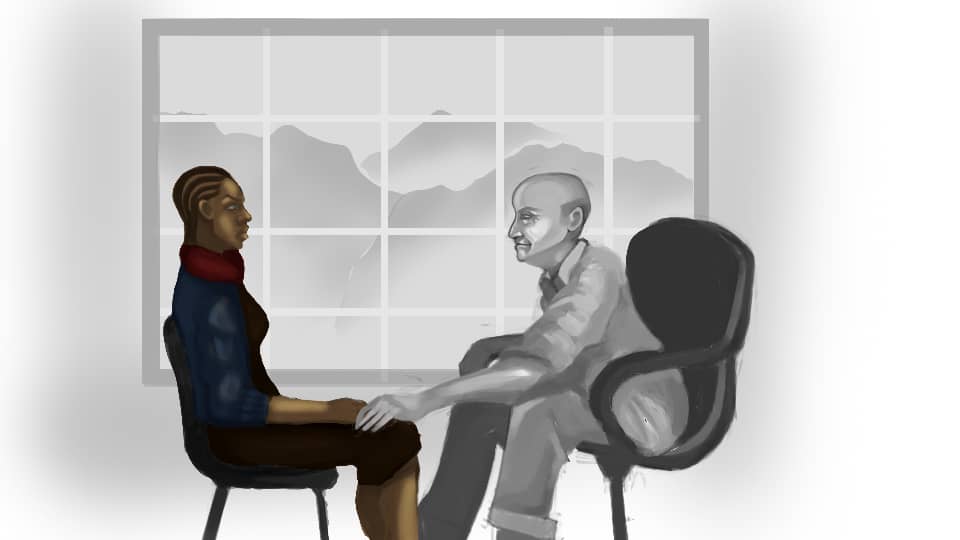
“You are a pig,” she said in anger, rushing out of the office.
“Wrong choice, Kaya!” he called out as the door slammed shut behind her.
Outside of the office, blinded by her anger, she bumped into a lady. She lost her balance and almost fell, but the person caught her.
“I am… so…sorry” she said breathlessly.
“Hey, it is okay. Are you okay?” the woman she bumped into asked.
Kaya managed a nod trying to catch her breath. She saw many women chanting on the street.“You are the woman I saw going into Mr. Tapiwa’s office,” Ayatunde said.
Kaya nodded.
“I take it did not go well?”
“He wants me to sleep with him so that he can help my community.”
“I am sorry you had to go through that. My name is Ayatunde. Why don’t you come and join us,” Ayatunde said gesturing at the group of women behind her. Martha held out her hand towards Kaya and Ayatunde.
They all linked hands.
“Are you ready?” Martha asked. All the women nodded.
“Good. Now, let’s fight for our rights.”
